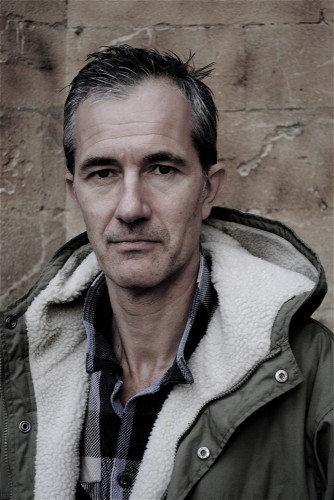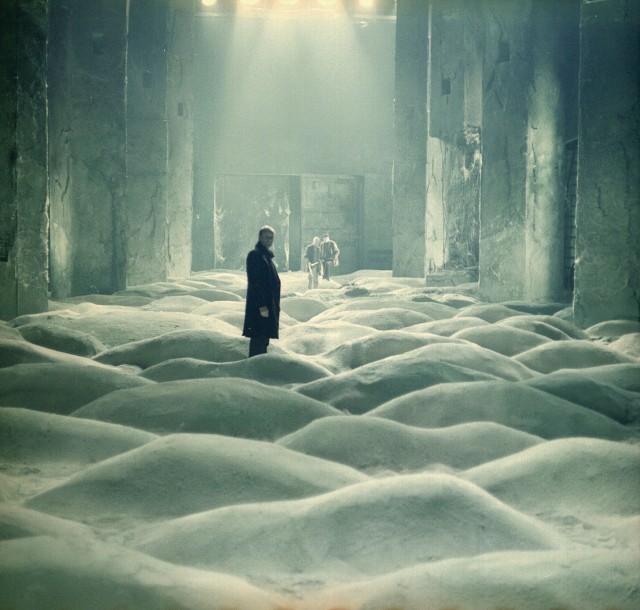
ZONA: A BOOK ABOUT A FILM ABOUT A JOURNEY TO A ROOM
Friday, March 9, 192 Books, 192 Tenth Ave., free, 7:00
Saturday, March 10, “Tarkovsky Interruptus,” the New School, Tishman Auditorium, 6 West 12th St., free, 5:00
Sunday, March 11, “Geoff Dyer on Tarkovsky, Cinema, and Life,” Museum of the Moving Image, 36-01 35th Ave., free with museum admission, 3:00 & 6:00
Monday, March 12, School of Visual Arts, Beatrice Theater, 333 West 23rd St., free, 7:00
“This book is an account of watching, rememberings, misrememberings, and forgettings; it is not the record of a dissection,” British author Geoff Dyer writes in Zona: A Book About a Film About a Journey to a Room (Pantheon, February 21, $24). Over the course of some two hundred pages, Dyer immerses the viewer in the fantastical world of Andrei Tarkovsky’s 1979 film, Stalker, in which the title character leads two men, Writer and Professor, on a dangerous trip into the Zone, a mysterious area that harbors a room where people’s most inner desires are said to come true. Dyer’s obsessively thorough scene-by-scene examination of the film includes tidbits about the making of the existential work as well as stories about his own personal life while referencing Michelangelo Antonioni and Jean-Luc Godard, Roland Barthes and Timothy Leary, Werner Herzog and Richard Widmark, Leo Tolstoy and T. S. Eliot, Mick Jagger and Jim Jarmusch, Milan Kundera and Don DeLillo, John Berger and Alan Watts, and Robert Bresson and Ingmar Bergman, sometimes extending footnotes across several pages that dwarf the main text. Zona is a wonderful companion piece to the film, a must-read for fans of Tarkovsky and the study of cinema itself.
On March 9, Dyer will be reading from and signing copies of Zona at 192 Books in Chelsea, then will participate in the “Tarkovsky Interruptus” program being held at the New School on March 10, a screening of Stalker that will occasionally be interrupted by commentary from Dyer, Walter Murch, Phillip Lopate, Francine Prose, Michael Benson, and Dana Stevens. Dyer will continue his whirlwind adventure on March 11 at the Museum of the Moving Image when he hosts “Geoff Dyer on Tarkovsky, Cinema, and Life,” a discussion with David Schwartz at 3:00, followed by a screening of Tarkovsky’s Mirror at 6:00. And on March 12 he’ll be at the School of Visual Arts for a lecture and book signing.

Geoff Dyer will share his Tarkovsky obsession with special appearances all over the city (photo by Marzena Pogorzaly)
twi-ny: In Zona, you essentially play the part of Writer, Professor, and Stalker as you guide readers through the film and certain parts of your life. Which of the three characters do you most closely identify with?
Geoff Dyer: Well, ostensibly it would have to be Writer. He’s my embedded representative. I like his washed-up-ness, his sense of failure, his dissatisfaction with himself and the world. But ultimately it would be Stalker because he’s a believer.
twi-ny: You first saw Stalker in February 1981; how many times have you now seen it on the big screen?
Geoff Dyer: I’ve lost track. More than any film except Where Eagles Dare, which, now that I think of it, I’ve only seen on the big screen once. At this particular moment I’m not in a hurry to see it again but I’m sure I will do so again in the future. It is nothing if not inexhaustible — despite my attempts to exhaust it.
twi-ny: On March 11, you’ll be at the Museum of the Moving Image introducing Tarkovsky’s Mirror, which is mentioned often in Zona. What should a Tarkovsky virgin know about Mirror before experiencing it?
Geoff Dyer: I don’t think you need to know much about it; you just need to relax, to abandon preconceptions and expectations about how a film should proceed, and give yourself to it. It’s the same with Indian classical music; people worry that they don’t know enough to get into it when all you really need is a pair of ears. On reflection, maybe cannabis helps in both these cases. It might also be interesting to think about Terence Malick’s recent Tree of Life. He must have had Mirror in mind when he was making that.
twi-ny: In previous books, you’ve taken unique approaches in examining D. H. Lawrence, jazz, John Berger, and now Andrei Tarkovsky and Stalker. Do you see any similarities among these subjects that drove you to write about them in such detail?
Geoff Dyer: Not really, only my own fan-ness, my love for these things. I see a different continuity with some of the other books — Yoga for People Who Can’t Be Bothered to Do It, The Missing of the Somme, and the second part of Jeff in Venice, Death in Varanasi — and that is more about an ongoing fascination with the idea of the Zone. The one in the film is a sort of invented place but I’ve been drawn to similar places in the real world — places of heightened meaning, of religious significance, places where time has stood its ground, where you have some kind of peak experience — in these books.
 Set in a seemingly postapocalyptic world that is never explained, Andrei Tarkovsky’s Stalker is an existential work of immense beauty, a deeply philosophical, continually frustrating, and endlessly rewarding journey into nothing less than the heart and soul of the world. Alexander Kaidanovsky stars as Stalker, a careful, precise man who has been hired to lead Writer and Professor (Tarkovsky regulars Anatoli Solonitsyn and Nikolai Grinko, respectively) into the forbidden Zone, a place of mystery that houses a room where it is said that people can achieve their most inner desires. While Stalker’s home and the bar where the men meet are dark, gray, and foreboding, the Zone is filled with lush green fields, trees, and aromatic flowers — as well as abandoned vehicles, strange passageways, and inexplicable sounds. The Zone — which heavily influenced J. J. Abrams’s creation of the island on Lost — has a life all its own as past, present, and future merge in an expansive land where every forward movement is fraught with danger but there is no turning back. An obsessive tyrant of a filmmaker, Tarkovsky imbues every shot with a supreme majesty, taking viewers on an unusual and unforgettable cinematic adventure. Loosely based on the novel Roadside Picnic by the Strugatsky Brothers, Stalker is screening July 17 at 7:00 as part of the the Museum of Arts & Design film series “Andrei Tarkovsky, Sculpting in Time,” which runs Friday nights through August 28 and includes all seven of Tarkovsky’s masterpieces (Solaris, Stalker, Ivan’s Childhood, Andrei Rublev, The Mirror, Nostalghia, The Sacrifice) before concluding with the behind-the-scenes documentary Directed by Andrei Tarkovsky. Tarkovsky, who died in 1986 at the age of fifty-four, was a superior craftsman whose cinematic oeuvre is filled with poetry and wonder, mystery and self-examination, exploring life and death, the past, the present, and the future, incorporating mesmerizing sound and visuals in telling complex stories like one else before or since. (For our 2012 twi-ny talk with Geoff Dyer, the author of Zona: A Book about a Film about a Journey to a Room, which offers quite a unique take on Stalker, go here.)
Set in a seemingly postapocalyptic world that is never explained, Andrei Tarkovsky’s Stalker is an existential work of immense beauty, a deeply philosophical, continually frustrating, and endlessly rewarding journey into nothing less than the heart and soul of the world. Alexander Kaidanovsky stars as Stalker, a careful, precise man who has been hired to lead Writer and Professor (Tarkovsky regulars Anatoli Solonitsyn and Nikolai Grinko, respectively) into the forbidden Zone, a place of mystery that houses a room where it is said that people can achieve their most inner desires. While Stalker’s home and the bar where the men meet are dark, gray, and foreboding, the Zone is filled with lush green fields, trees, and aromatic flowers — as well as abandoned vehicles, strange passageways, and inexplicable sounds. The Zone — which heavily influenced J. J. Abrams’s creation of the island on Lost — has a life all its own as past, present, and future merge in an expansive land where every forward movement is fraught with danger but there is no turning back. An obsessive tyrant of a filmmaker, Tarkovsky imbues every shot with a supreme majesty, taking viewers on an unusual and unforgettable cinematic adventure. Loosely based on the novel Roadside Picnic by the Strugatsky Brothers, Stalker is screening July 17 at 7:00 as part of the the Museum of Arts & Design film series “Andrei Tarkovsky, Sculpting in Time,” which runs Friday nights through August 28 and includes all seven of Tarkovsky’s masterpieces (Solaris, Stalker, Ivan’s Childhood, Andrei Rublev, The Mirror, Nostalghia, The Sacrifice) before concluding with the behind-the-scenes documentary Directed by Andrei Tarkovsky. Tarkovsky, who died in 1986 at the age of fifty-four, was a superior craftsman whose cinematic oeuvre is filled with poetry and wonder, mystery and self-examination, exploring life and death, the past, the present, and the future, incorporating mesmerizing sound and visuals in telling complex stories like one else before or since. (For our 2012 twi-ny talk with Geoff Dyer, the author of Zona: A Book about a Film about a Journey to a Room, which offers quite a unique take on Stalker, go here.)

 “Words can’t really express a person’s emotions. They’re too inert.” So says Andrei Tarkovsky’s dream-filled, surreal masterpiece The Mirror, which features long scenes with little or no dialogue. Tarkovsky turns the mirror on himself and his childhood to tell the fragmented and disjointed story of WWII-era Russia through his own personal experiences with his family. Tarkovsky was obsessed with film as art, and this nonlinear film is his poetic masterpiece; he even includes his father’s poems read over shots that are crafted as if paintings. Many of the actors play several roles; have fun trying to figure out who is who and what exactly is going on at any one moment. The Mirror is screening on March 11 at 6:00 at the Museum of the Moving Image as part of the special program “Geoff Dyer on Tarkovsky, Cinema, and Life” and the ongoing “See It Big!” series and will be introduced by award-winning author Dyer, whose latest nonfiction tome is Zona: A Book About a Film About a Journey to a Room (Pantheon, February 21, $24), an obsessively detailed examination of Tarkovsky’s
“Words can’t really express a person’s emotions. They’re too inert.” So says Andrei Tarkovsky’s dream-filled, surreal masterpiece The Mirror, which features long scenes with little or no dialogue. Tarkovsky turns the mirror on himself and his childhood to tell the fragmented and disjointed story of WWII-era Russia through his own personal experiences with his family. Tarkovsky was obsessed with film as art, and this nonlinear film is his poetic masterpiece; he even includes his father’s poems read over shots that are crafted as if paintings. Many of the actors play several roles; have fun trying to figure out who is who and what exactly is going on at any one moment. The Mirror is screening on March 11 at 6:00 at the Museum of the Moving Image as part of the special program “Geoff Dyer on Tarkovsky, Cinema, and Life” and the ongoing “See It Big!” series and will be introduced by award-winning author Dyer, whose latest nonfiction tome is Zona: A Book About a Film About a Journey to a Room (Pantheon, February 21, $24), an obsessively detailed examination of Tarkovsky’s 

